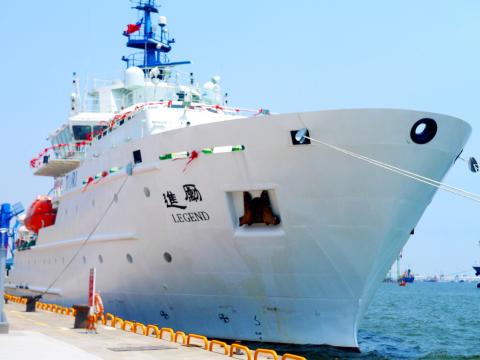Researchers aboard the nation’s largest research vessel, the Legend (勵進), are to return today from a scientific expedition to the South China Sea to collect data on vertical temperature changes in the sea basin, the National Applied Research Laboratories (NARL) said yesterday.
The government has maintained a low profile when conducting missions in the area, given disputes arising from overlapping territorial claims from Taiwan, the Philippines, Vietnam and China among others.
After setting off from Tainan’s Anping Port (安平港) on March 9, the 2,629-tonne vessel is to return to port today, concluding its 25-day mission that was aimed at measuring geological and weather conditions, promoting scientific collaboration and joint sea development, the NARL said.

Photo: Chien Hui-ju, Taipei Times
The research team is made up of 19 crew members and 21 researchers from the NARL’s Taiwan Ocean Research Institute, the Naval Meteorological and Oceanographic Office, National Taiwan University and National Central University, it said.
The team measured the sea basin using the vessel’s multibeam echosounder and produced the first precise map of a 4,000m-high seamount in the center of the basin, it said, adding that the mount is 676km from southwestern Taiwan’s coast.
Researchers also found fragments of sedimentary strata near the seamount, allowing them to study if the collapse of a deep sea range might trigger a tsunami, it said.
They also measured the temperature, humidity, atmospheric pressure and wind speed on the Pratas Islands (Dongsha Islands, 東沙群島) and Itu Aba Island (Taiping Island, 太平島), it said.
They obtained “unprecedented” data on vertical temperature changes near the center of the South China Sea Basin, in a range up to 20km in the air and 1,800m below the sea level, it said, adding that the data are valuable for boosting weather forecasting in the region.
The NARL said the team did not encounter any pressure from other countries during the mission.
The research vessel was built by Singaporean-based Triyards Marine Services at a cost of about NT$880 million (US$28.6 million at the current exchange rate) and was inaugurated in May last year.
It underwent 10 months of testing and trial runs before embarking on its first research mission, which was postponed from September last year to last month.

Intelligence agents have recorded 510,000 instances of “controversial information” being spread online by the Chinese Communist Party (CCP) so far this year, the National Security Bureau (NSB) said in a report yesterday, as it warned of artificial intelligence (AI) being employed to generate destabilizing misinformation. The bureau submitted a written report to the Legislative Yuan in preparation for National Security Bureau Director-General Tsai Ming-yen’s (蔡明彥) appearance before the Foreign Affairs and National Defense Committee today. The CCP has been using cognitive warfare to divide Taiwanese society by commenting on controversial issues such as Taiwan Semiconductor Manufacturing Co’s (TSMC, 台積電) investments in the

INVESTIGATION: The case is the latest instance of a DPP figure being implicated in an espionage network accused of allegedly leaking information to Chinese intelligence Democratic Progressive Party (DPP) member Ho Jen-chieh (何仁傑) was detained and held incommunicado yesterday on suspicion of spying for China during his tenure as assistant to then-minister of foreign affairs Joseph Wu (吳釗燮). The Taipei District Prosecutors’ Office said Ho was implicated during its investigation into alleged spying activities by former Presidential Office consultant Wu Shang-yu (吳尚雨). Prosecutors said there is reason to believe Ho breached the National Security Act (國家安全法) by leaking classified Ministry of Foreign Affairs information to Chinese intelligence. Following interrogation, prosecutors petitioned the Taipei District Court to detain Ho, citing concerns over potential collusion or tampering of evidence. The

‘COMPREHENSIVE PLAN’: Lin Chia-lung said that the government was ready to talk about a variety of issues, including investment in and purchases from the US The National Stabilization Fund (NSF) yesterday announced that it would step in to staunch stock market losses for the ninth time in the nation’s history. An NSF board meeting, originally scheduled for Monday next week, was moved to yesterday after stocks plummeted in the wake of US President Donald Trump’s announcement of 32 percent tariffs on Taiwan on Wednesday last week. Board members voted to support the stock market with the NT$500 billion (US$15.15 billion) fund, with injections of funds to begin as soon as today. The NSF in 2000 injected NT$120 billion to stabilize stocks, the most ever. The lowest amount it

NEGOTIATIONS: Taiwan has good relations with Washington and the outlook for the negotiations looks promising, Minister of Economic Affairs J.W. Kuo said Taiwan’s GDP growth this year is expected to decrease by 0.43 to 1.61 percentage points due to the effects of US tariffs, National Development Council (NDC) Minister Paul Liu (劉鏡清) said at a meeting of the legislature’s Economics Committee in Taipei yesterday, citing a preliminary estimate by a private research institution. Taiwan’s economy would be significantly affected by the 32 percent “reciprocal” tariffs slapped by the US, which took effect yesterday, Liu said, adding that GDP growth could fall below 3 percent and potentially even dip below 2 percent to 1.53 percent this year. The council has commissioned another institution